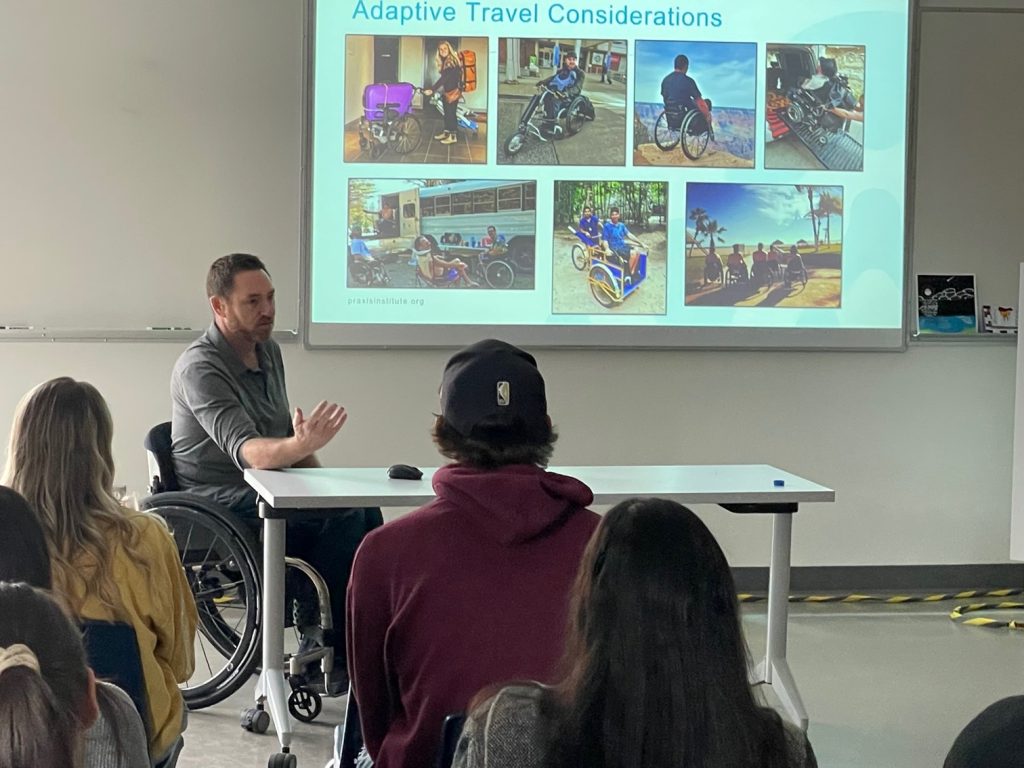This is the breadcrumbs block. Breadcrumb will populate on actual page.
Bringing Lived Perspectives for Local SCI Care
Praxis exists to lead global collaboration in spinal cord injury research, innovation and care. We translate knowledge to bridge health evidence with real-world delivery. The word praxis means the practical application of a theory – moving knowledge into action. We measure our success through impact, how Praxis makes a difference to the SCI community.
“What I liked best about the workshop was hearing the functional and lived-experience perspectives. I can do my own reading about spinal cord injury (SCI) medically; however, it was SO valuable to talk to someone about it and hear about different functional options for functional differences.”
Praxis BC interior outreach brings best practices for SCI care to remote and rural practitioners. Lived perspectives boost local SCI care.
Praxis BC Interior Regional Clinical Liaison, Shannon Rockall, and Community Liaison, James Hektner hosted a series of supplementary education sessions for clinical practitioners to tackle the lack of local specialized services for SCI. Sessions also presented panel input from people with lived experience (PLEX), giving clinical practitioners insight and access to best practices and priorities in the SCI community. Sessions generated positive feedback from attendees, many noting that hearing directly from people with SCI brought awareness, giving new insight into how to care for clients more effectively and respectfully.

“Learned a lot about how experiences can be so different even with similar injuries ‘on paper’. Good reminder to be person-centered and listen to my clients.”
Sustaining a spinal cord injury (SCI) results not only in varying degrees of paralysis and dysfunction but also lifelong exposure to secondary complications such as pressure injury. This means that for wheelchair users, sitting comfortably is more than just pleasant – it’s also essential. Pressure injuries due to circulation and tissue damage issues from prolonged sitting or badly designed surfaces cause serious tissue damage. This is frequently difficult to treat without prolonged bed rest and hospitalization, both of which impact quality of life. Premature death isn’t an uncommon sequel.
In order to minimize the risk of pressure injuries, especially when long periods are spent seated or recumbent, users must regularly shift position. With impaired sensation in the area, being proactive in skin care is essential and this means remembering to manually offload or shift seating position around to avoid tissue damage.
Quality of care and support for spinal cord injury (SCI) is essential for optimal recovery and successful return to the community. However, the standard of care often depends on where you are treated and where you live. Inequities in access to evidence-based best practices in care are profound outside urban centres of excellence. For example, in BC’s Interior Health Region (Okanagan, Thompson Cariboo Shuswap, Kootenay), persons living with SCI are required to travel to the Lower Mainland to access specialized services. Although building local centres of excellence may be impractical, clinical education to bring clinical providers up-to-speed can help fill knowledge gaps and bring best practices into action.
As a solution, Praxis Regional liaisons brought outreach to their clinical care community. Using an integrated knowledge translation (IKT) model that involved clinicians, healthcare students, researchers and persons living with SCI, James and Shannon, members of the Praxis clinical and PLEX teams hosted a number of hands-on and virtual workshops. Content and interactive delivery aimed to increase clinician knowledge and confidence when working with clients with spinal cord injuries.
And that’s what happened!
Feedback showed that sessions made an impact on the attendees. Pre- and post-session polling showed not only enthusiasm for the format and the topics covered, but also increased confidence and awareness of the issues raised. Attendees noted how important it was for them to hear directly from PLEx and how much more aware they felt of priorities in care.
“I enjoyed the discussion regarding sympathy vs. empathy. I will continue to be mindful of this in the future.”
Following one session, attendees noted that the most important take-home message was that PLEX experience serious challenges with the healthcare system. Others in the same session remarked that they would be better prepared to welcome new clients back from initial rehab, to ask before assuming, and “the importance of treating each person as an individual and having them direct their own care”.
Polling also showed increased awareness of common secondary issues experienced by people living with SCI, such as pressure injuries and respiratory health, following a SCI 101 workshop.
In a session on pressure injuries (PI), all attendees found listening to personal experience of the injury most helpful. Most people with SCI will experience a PI at least twice in their lives, with serious impact on quality of life that in some cases leads to a fatal outcome.
With more sessions planned for the future, the team hopes the work will help to establish networks and communities of practice in the region. Through ongoing dialogue and network development this outreach will increase knowledge and clinical practice skills to ensure higher quality care is delivered locally throughout the region.
“Thank you so much for sharing! It is so valuable to hear people’s stories and how they are affected, especially when we work with people for short periods of time and don’t often know how the story ends for people.”
